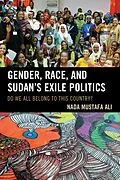Gender, Race, and Sudan's Exile Politics examines the gendered and racialized discourses and practices of the Sudanese opposition in exile through the opposition movements of the 1990s and early 2000s, and discusses the history through which these discourses evolved.
The military coup that brought the National Islamic Front (NIF)-now National Congress Party (NCP)- to power in 1989 not only forced most political parties, trade unions, and activists in Sudan into either exile politics or underground activism; it also urged many of Sudan's political forces and activists to rethink the meaning of belonging and of the "Old" Sudan. In the mid-1990s, this involved a rethinking of the relationship between religion and politics, acknowledging Sudan's diversity, acknowledging the need to restructure Sudan's economy and politics to ensure equal access and participation for the historically marginalized, and committing to self-determination for the people of South Sudan. The concept of the New Sudan broadly captured this rethinking.
This book interrogates the relationship between women's organizations and activisms in exile on one hand, and nationalist, transformative, and other political movements and processes on the other. It further discuses transnational coalition building across difference, including racial difference, between women's organization seeking to transform gender relations in Sudan and South Sudan.
Autorentext
By Nada Mustafa Ali
Zusammenfassung
Gender, Race, and Sudan's Exile Politics examines the gendered and racialized discourses and practices of the Sudanese opposition in exile through the opposition movements of the 1990s and early 2000s, and discusses the history through which these discourses evolved.
The military coup that brought the National Islamic Front (NIF)now National Congress Party (NCP) to power in 1989 not only forced most political parties, trade unions, and activists in Sudan into either exile politics or underground activism; it also urged many of Sudan's political forces and activists to rethink the meaning of belonging and of the Old Sudan. In the mid-1990s, this involved a rethinking of the relationship between religion and politics, acknowledging Sudan's diversity, acknowledging the need to restructure Sudan's economy and politics to ensure equal access and participation for the historically marginalized, and committing to self-determination for the people of South Sudan. The concept of the New Sudan broadly captured this rethinking.
This book interrogates the relationship between women's organizations and activisms in exile on one hand, and nationalist, transformative, and other political movements and processes on the other. It further discuses transnational coalition building across difference, including racial difference, between women's organization seeking to transform gender relations in Sudan and South Sudan.
Inhalt
Chapter One: Introduction: Gender, Race, and Sudan's Exile PoliticsChapter Two: Gender and Intersectionality in Sudan and South Sudan: Catching Jargonitis
Chapter Three: Colonialism, Nationalism, and Islamism
Chapter Four: Gendered Discourses and Practices of the Sudanese Opposition in Exile
Chapter Five: Gender and New Sudan's Vision and Political PracticesChapter Six: Gender, Intersectionality, and Transnational Activism: Women Resisting Marginalization and Exclusion
Conclusion: 'Thorny Issues' and Perilous Coalitions
